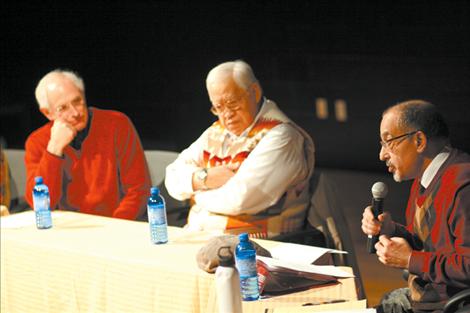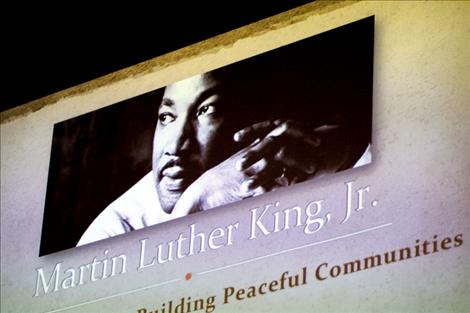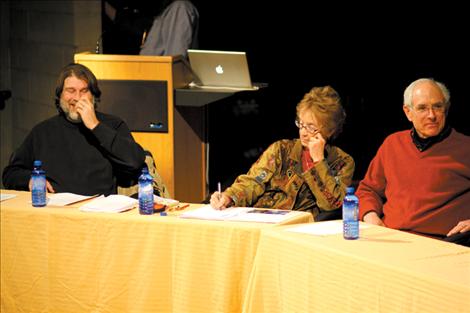SKC Interfaith Peace Panelists speak on faith, humanism, relationships
Hey savvy news reader! Thanks for choosing local.
You are now reading
1 of 3 free articles.
PABLO — In observance of the late Dr. Martin Luther King Jr. and his life work, seven people hailing from seven different upbringings, cultures, ethnic groups and religions met in Salish Kootenai College’s Vic Charlo and Johnny Arlee Theatre in the early evening hours Jan. 17. The discussion focused on the panelists’ respective beliefs on humanity, religion and spirituality and how these beliefs might be used to build a more cohesive, peaceful and understanding community.
Event organizer and SKC professor Doug Ruhman said the college holds a week-long Dr. Martin Luther King Jr. celebration every year. Fittingly, the seven panelists sat under a large photograph of Dr. King as the discussion began.
“This year, we wanted to return to Dr. King’s vision and background and look at his story a little more closely,” Ruhman said. “Because he was a clergyman, we wanted to explore different spiritual perspectives and bring all those different perspectives into one room and ask ourselves, ‘How can we create what Dr. King called a ‘beloved community,’ and what can we do as individuals to help build better communities that are more peaceful, tolerant and less violent?’
“Especially in light of recent national events (such as the recent Sandy Hook school shooting) we thought this event would be well-timed.”
The seven panelists included:
Tony Incashola— Representing the Salish tradition as a Salish elder, Incashola is also the director of the CSKT’s Salish-Pend d’Oreille Culture Committee.
Jeff Bendremer— Representing the Jewish faith, Bendremer is an SKC professor and director of the Tribal Historic Preservation Program.
Gary Hawk— Representing the Christian faith, Hawk is a professor at the University of Montana.
Charlotte Kasl— Representing the Quaker faith, Charlotte Kasl is a psychotherapist and author of “If the Buddha Had Kids: Raising Children to Create a More Peaceful World.”
Samir Bitar— Representing the Islamic faith, Bitar is a professor at the University of Montana and has lived in Montana since he was 16. Bitar said his wife of 30 years is a Christian.
David Moore— Representing the Baha’i faith, Moore teaches at the University of Montana.
Jerry Smyers— Representing Zen Buddhism, Smyers is a teacher at the Mission Mountain Zen Group in Polson.
Each panelist was given the opportunity to say a few words regarding their faith and life experience and how it related to Dr. King’s views and the idea of building better communities.
Bendremer spoke of Dr. King’s belief in the interrelated and intertwined nature of humanity. Smyers and Moore spoke of the essential oneness of humanity and cultivating self-understanding and awareness of self. Hawk spoke of a shared dependence on the land, air, water, food, animals, fish, berries, herbs and how “our wellbeing depends on the earth and how we treat its living systems.” Incashola spoke of an end to hate, greed and jealousy through a shared understanding of each other.
“I did not know I was poor growing up, because of the love and understanding and trust in the communities I lived in,” Incashola said. “I didn’t see anything else outside of that, and I think we’ve gotten away from that as a society ... But there is a belief that someday we will get to that point where there is no hatred, only love, and all things will become equal again.
“Tonight, I hope I’m here to represent that belief. If we took the time to sit and understand each other, we’d start looking at each other as equals.”
Regardless of their faith, beliefs and ethnicity, spectator Kara Finley noticed one common theme running though every speaker’s belief system.
“Children,” Finley said. “There was mention of parenting, teaching and mentoring in every one of those speeches ... Yea, it was great to have.”


















